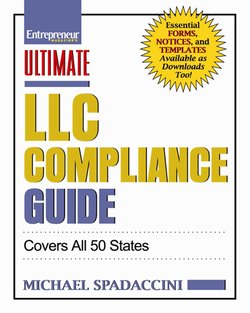Читать книгу Ultimate LLC Compliance Guide - Michael Spadaccini - Страница 25
На сайте Литреса книга снята с продажи.
Registered Office and Registered Agent
ОглавлениеA registered agent (or registered office or resident agent—the terms are synonymous) is a person or entity authorized and obligated to receive legal papers on behalf of an LLC. (Corporations have registered agents also.) The registered agent is identified in the articles of organization, but it can typically be changed by filing a notice with the secretary of state. The registered agent serves an important function: an LLC is not a physical person, so it would be impossible to serve legal papers on an LLC if there were no designated representative. The registered agent is designated by language such as “The name and address in the State of California of this LLC’s initial agent for service of process are John Jones, 123 Elm Street, San Francisco, California 94107.”
Your state of organization may use a term other than registered agent. In addition to registered office or resident agent, typical equivalents include agent for service of process and local agent.
The agent can be you, a family member, an LLC officer, an attorney, or a professional company that specializes in corporation and LLC support services. With millions of corporations and LLCs in America, professional resident agent services are big business. The registered agent’s name is a public record; if you desire anonymity, then hire a professional to perform this service. The agent must have a physical address in the state of organization. Thus, if your business does not operate in the state of organization, you will need to hire a registered agent in that state. You must consider this additional expense when organizing out of state. Such services typically range from $50 to $350 per year.
Using an attorney or professional firm as your agent has advantages, if you don’t mind the cost. The primary role of an agent is to receive service of legal papers; an attorney or a professional firm is likely to maintain a consistent address and is likely to understand the nature of any legal papers served. The agent will also receive important state and federal mail such as tax forms, annual report forms, legal notices, and the like.
▼ Expert Tip
Professional Registered Agents Can Help. If you are organizing your LLC yourself, registered agents can be valuable sources of information about the state in which you are filing. Because most registered agents work so closely with the secretary of state’s office on behalf of many companies, they become experts in dealing with the secretary of state’s office. Remember: paid resident agents want your business, the yearly fees, so they won’t mind answering a few questions free. You might confirm with them the amount of the filing fees to include with your articles of organization or you might ask for a free sample of articles of organization that they recommend.
Note that most secretary of state offices where you file your LLC organization papers will not check to see if you have properly secured the services of a registered agent. If you do not select a registered agent properly, the secretary of state will simply mail to the registered agent’s address any documents that you submit with your articles of organization. If you do not select a registered agent properly, you will not receive them. Thus, you should hire your registered agent either before or when filing your articles of organization.
▼ Expert Tip
Don’t overpay for resident agent services. The prices vary widely. If you are paying more than $75, you did not shop around enough. In Delaware, the cheapest and best is Harvard Business Services ($50 per year, www.delawareinc.com). In Nevada, use Resident Agents of Nevada ($90 per year, www.nevada.org). (These two states are popular choices for incorporation, for reasons discussed later in this chapter.) In all other states, I use Business Filings, Inc., which offers resident agent and formation services in all 50 states. Check www.bizfilings.com.
On the next page you’ll find a sample letter.
